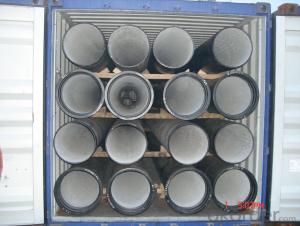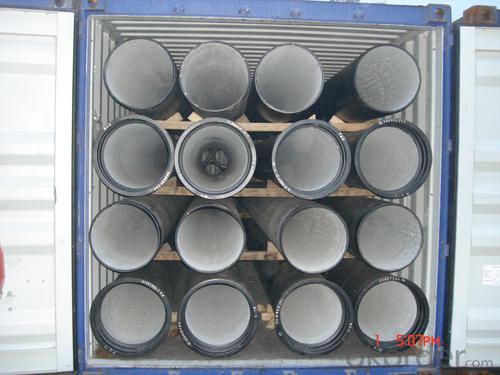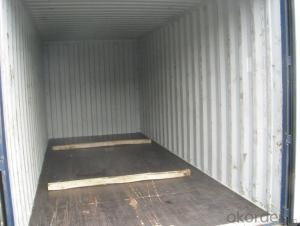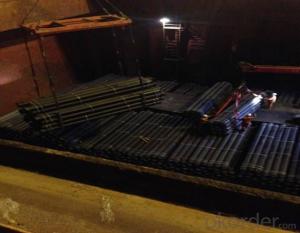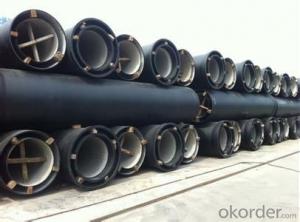DUCTILE IRON PIPE DN1400 K8
- Loading Port:
- Tianjin
- Payment Terms:
- TT OR LC
- Min Order Qty:
- -
- Supply Capability:
- 30000Tons m/month
OKorder Service Pledge
OKorder Financial Service
You Might Also Like
CNBM ductile iron pipe ranges from DN80-DN1600mm (T-Type, Class K9), effective length 6m, comply with ISO2531 Standard
Company Profile
CNBM International Corporation is the leading production base and renowned supplier of Ductile Iron Water Pipe systems of both potable and waste water in China. We are constantly looking to develop high quality products to ensure the longest service life and wonderful performance.
CNBM Pipelines regard quality as the essential factor leading to successful business. Every pipe is tested in accordance with BS EN545 (water application) or BS EN598 (sewer application). CNBM Pipelines products comply with and are tested according to the relevant European and International Standards. Our pipes are manufactured under the quality management system BS EN ISO 9001. After years of efforts, CNBM Pipelines has built up great reputation in terms of quality and service among customers worldwide
Product Introduction
CNBM ductile iron pipe ranges from DN80-DN1600mm (Tyton, T-Type, Class K7/K8/K9), effective length: 6m, complying with BS EN545/EN598/ISO2531/BS4772.
Specification& Payment terms
Internal lining: Pipes shall have an internal cement mortar lining in acc with ISO4179.
External coating: Pipes shall be externally coated with metallic zinc spray plus a further layer of resin painting to ISO8179.
Gasket: 100% SBR/NBR/EPDM gasket in accordance with ISO4633.
Packing: Pipes from DN100 to DN300 be bundled with steel belts, the others are in bulk.
Payment term: By 30% T/T advance payment + 70% Irrevocable L/C at sight.
Packing: In bulk vessel or in container.
- Q: Can ductile iron pipes be used for water distribution networks in rural areas?
- Ductile iron pipes are suitable for water distribution networks in rural areas due to their high strength and durability. These pipes are known for their ability to withstand external loads and pressure, making them ideal for underground installations. Additionally, they have excellent resistance to corrosion and can withstand harsh environmental conditions or agricultural activities. In rural areas, where the water distribution network may face challenging conditions, ductile iron pipes offer a reliable solution. They are less likely to crack or leak, ensuring a continuous water supply for rural communities. Moreover, these pipes have a long service life, often exceeding 100 years, making them a cost-effective choice that requires minimal maintenance and replacement. However, it is crucial to consider other factors such as the availability of ductile iron pipes, installation costs, and the technical expertise required for installation and maintenance. Local regulations and standards should also be followed to ensure compliance and safety. Overall, ductile iron pipes can provide a suitable and dependable option for water distribution networks in rural areas. They offer a long-lasting and efficient solution for delivering clean water to communities.
- Q: What are the typical applications for ductile iron pipes?
- Ductile iron pipes are commonly used for a variety of applications including water and sewage transportation, irrigation systems, fire protection systems, and industrial processes. They are also suitable for underground and aboveground installations due to their durability, corrosion resistance, and ability to handle high pressure and heavy loads.
- Q: Are ductile iron pipes suitable for fire protection systems?
- Ductile iron pipes are a perfect choice for fire protection systems. Ductile iron, being a robust and durable material, can endure extreme pressure and temperature fluctuations, making it an ideal option for reliable and long-lasting pipes in fire protection systems. Moreover, ductile iron demonstrates exceptional resistance to corrosion, preventing any deterioration of the pipes and ensuring the integrity of the fire protection system over time. Additionally, the high tensile strength of ductile iron provides added safety advantages, as it can withstand the stress and strain that may arise during a fire incident. Consequently, ductile iron pipes are extensively utilized in fire protection systems across various applications, including commercial buildings, industrial facilities, and residential areas.
- Q: How do ductile iron pipes handle heavy traffic loads?
- Ductile iron pipes are extremely durable and can handle heavy traffic loads with ease. This is due to their exceptional strength and flexibility. The composition of ductile iron, which includes graphite nodules, allows the material to be more flexible than traditional cast iron pipes. This flexibility enables the pipes to withstand heavy traffic loads, including the weight of vehicles passing over them. Additionally, ductile iron pipes have a high load-bearing capacity, which means they can support substantial weights without experiencing deformation or structural failure. This makes them suitable for use in areas with heavy traffic, such as highways, bridges, and industrial sites. Furthermore, ductile iron pipes have excellent resistance to external forces, such as vibrations and impacts. They can absorb and distribute these forces throughout the pipe network, preventing damage and maintaining structural integrity. In summary, ductile iron pipes are specifically designed to handle heavy traffic loads. Their strength, flexibility, and load-bearing capacity make them a reliable choice for infrastructure projects where durability and longevity are essential.
- Q: Can ductile iron pipes be used for irrigation systems?
- Yes, ductile iron pipes can be used for irrigation systems. Ductile iron pipes are commonly used in various applications, including water supply systems and irrigation systems. They are known for their strength, durability, and corrosion resistance, making them suitable for transporting water in irrigation systems.
- Q: Can ductile iron pipe be used for industrial process piping?
- Yes, ductile iron pipe can be used for industrial process piping. Ductile iron pipe is known for its strength, durability, and resistance to corrosion, making it a suitable choice for various industrial applications. It can handle high-pressure systems and is often used in industries such as water and wastewater treatment, oil and gas, chemical processing, and power generation. Additionally, ductile iron pipe is easy to install and has a long lifespan, making it a cost-effective option for industrial process piping.
- Q: Can ductile iron pipes be used for conveying gases?
- Indeed, gases can be conveyed using ductile iron pipes. Ductile iron, renowned for its strength and durability, is capable of enduring high pressures and temperature fluctuations, rendering it appropriate for gas transportation. Furthermore, ductile iron pipes possess exceptional resistance to corrosion, a crucial attribute when handling potentially corrosive gases. Nevertheless, it is of utmost importance to verify the compatibility between the specific gas being conveyed and ductile iron, in order to avert any chemical reactions or pipe damage. To ensure the secure and efficient conveyance of gases through ductile iron pipes, one must carefully consider proper engineering design and material selection.
- Q: The design uses water supply ductile iron pipe, PE corrosion protection pipe, HDPE pipe, please ask that good? What's the price of the two?
- Now the mainstream is PE pipe, ductile iron pipe has been going out.
- Q: How much is the installation cost of the ductile iron tube?
- From the hydraulic performance, because ductile pipe specifications generally refers to the inner diameter of PE pipe diameter specifications generally refers to the same specifications, because under the condition of ductile pipe can achieve greater runoff; from the installation and maintenance cost, ductile pipe have more favorable price. The inner wall of zinc spray, anti-corrosion materials such as cement mortar.
- Q: Advantages and disadvantages of ductile iron pipes
- The ductile iron pipe is widely used not only in foreign countries, and has also been in the country to promote the use of good, in many areas of our country, ductile iron pipe has been widely used in medium and small diameter water supply pipe; compare the performance of ductile iron pipe and steel pipe: steel pipe can be divided into seamed steel pipe and seamless in the water supply pipe, commonly used in welded tube. Compared with ductile iron pipes, the steel tube has the advantages of good toughness, high tensile strength, thin tube wall, high pressure resistance, long pipes and less interfaces. The biggest drawback is that the corrosion resistance is poor and the price is high. So, in general, except for small bore pipes and special projects (such as pipe jacking works);
Send your message to us
DUCTILE IRON PIPE DN1400 K8
- Loading Port:
- Tianjin
- Payment Terms:
- TT OR LC
- Min Order Qty:
- -
- Supply Capability:
- 30000Tons m/month
OKorder Service Pledge
OKorder Financial Service
Similar products
Hot products
Hot Searches
Related keywords
